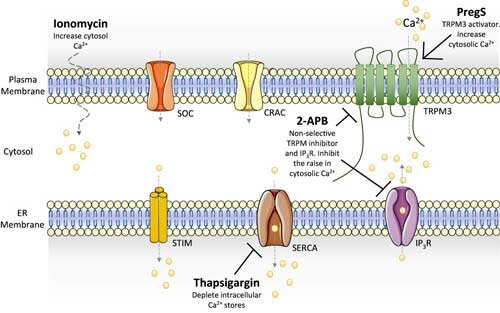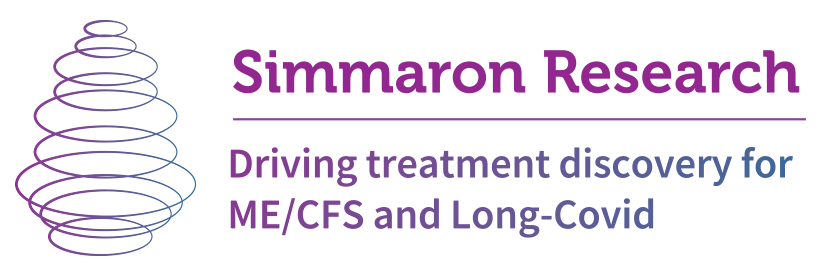Finally Found - A Natural Killer Cell Enhancer for ME/CFS?
For several years now, researchers at the National Centre for Neuroimmunology and Emerging Diseases (NCNED) at Griffith University in Australia have been leading the research on natural killer (NK) cells in chronic fatigue syndrome (ME/CFS). In fact, they recently published an overview on NK cells and ME/CFS. NK cells play a critical role in the innate immune response which kicks in first to fight off an infection. NK cells do just what their name implies: after alerting the immune system that trouble is ahead, they jump in and kill as many infected and damaged (cancer) cells as possible. The goal? To keep a pathogen in check long enough for big guns of the adaptive immune system (T and B cells) to rev up and ultimately destroy the invader.For some time now, the Griffith group has focused on an unusual subject for ME/CFS - ion channels - the very, very small channels in our neurons and cells - which play a big, big role in nerve and cell activation. Ion channels are getting a lot of interest in pain research but except for the Griffith team - not so much in ME/CFS.The problem with NK cells in ME/CFS is that they're just not killing very well. When given the chance to wipe out some infected cells, they pretty much poop out - not good news for anyone wanting to quickly knock down infections or remove cancerous cells.NK cells, like many cells, require intracellular calcium to function properly, the levels of which are regulated, at least in part, by the ion channels the Griffith group is studying. These TRPM ion channels are found in a wide variety of cells and tissues, and play a particularly important role in sensory processing - a big concern in ME/CFS.The ion channel that the Griffith group has been particularly interested in - TRPM member 3(TRPM3) - appears to be a jack of all trades. The fact that it can be activated by everything from temperature, natural chemicals, and toxins to synthetic compounds suggests it plays a fundamental role in the body, and, indeed, TRPM3 dysfunction has been implicated in inflammatory and neuropathic pain disorders.
NK cells play a critical role in the innate immune response which kicks in first to fight off an infection. NK cells do just what their name implies: after alerting the immune system that trouble is ahead, they jump in and kill as many infected and damaged (cancer) cells as possible. The goal? To keep a pathogen in check long enough for big guns of the adaptive immune system (T and B cells) to rev up and ultimately destroy the invader.For some time now, the Griffith group has focused on an unusual subject for ME/CFS - ion channels - the very, very small channels in our neurons and cells - which play a big, big role in nerve and cell activation. Ion channels are getting a lot of interest in pain research but except for the Griffith team - not so much in ME/CFS.The problem with NK cells in ME/CFS is that they're just not killing very well. When given the chance to wipe out some infected cells, they pretty much poop out - not good news for anyone wanting to quickly knock down infections or remove cancerous cells.NK cells, like many cells, require intracellular calcium to function properly, the levels of which are regulated, at least in part, by the ion channels the Griffith group is studying. These TRPM ion channels are found in a wide variety of cells and tissues, and play a particularly important role in sensory processing - a big concern in ME/CFS.The ion channel that the Griffith group has been particularly interested in - TRPM member 3(TRPM3) - appears to be a jack of all trades. The fact that it can be activated by everything from temperature, natural chemicals, and toxins to synthetic compounds suggests it plays a fundamental role in the body, and, indeed, TRPM3 dysfunction has been implicated in inflammatory and neuropathic pain disorders.
Ion Channels and ME/CFS
The Griffith group’s findings in ME/CFS stretch back almost four years. In 2016, they showed that both TRPM3 and intracellular concentrations of calcium were reduced in the NK cells of ME/CFS patients. These findings suggested that in ME/CFS, the signal to kill the pathogens wasn't getting through to the NK cells.That same year, Griffith introduced a potential explanation: the genes that governed TRP ion channel functioning - in particular, TRPM3 ion channel functioning - were loaded with mutations in ME/CFS. That same year, the group reported they'd found similar mutations in the B cells of ME/CFS patients. 2017 brought another study validating the TRPM3 channel reductions. Further testing indicated something had gone wrong with the TRPM3 receptors themselves. When stimulation tests found a reduction in Ca2+ mobilization was occurring, the researchers proposed something startling: that TRPM3 channels across the body could be malfunctioning.
2017 brought another study validating the TRPM3 channel reductions. Further testing indicated something had gone wrong with the TRPM3 receptors themselves. When stimulation tests found a reduction in Ca2+ mobilization was occurring, the researchers proposed something startling: that TRPM3 channels across the body could be malfunctioning.
"As TRPM3 receptors are expressed throughout the human body, the current findings suggest that impaired TRPM3 function may play a significant role in the multisystemic pathomechanism of CFS/ME."
Given how ubiquitous TRPM ion channels are, the loss of them body-wide could be responsible for many of the multitudinous symptoms associated with ME/CFS.2018 and 2019 brought further validation of their previous findings (in small studies). Just this month, the group published evidence that a related ion channel, TRPM2 - perhaps in a compensatory response - is over-expressed on ME/CFS patients' NK cells. Despite its increased levels, it too was not functioning well.Then in October of this year came a potential fix for the NK cell problem in ME/CFS.Front. Immunol., 31 October 2019 Naltrexone Restores Impaired Transient Receptor Potential Melastatin 3 Ion Channel Function in Natural Killer Cells From Myalgic Encephalomyelitis/Chronic Fatigue Syndrome Patients, Helene Cabanas1,2,3*, Katsuhiko Muraki3,4, Donald Staines1,2,3 and Sonya Marshall-Gradisnik1,2, https://doi.org/10.3389/fimmu.2019.02545Naltrexone hydrochloride (NTX) is best known in its low dose form in ME/CFS. It was referred to in this paper, though, simply as naltrexone. NTX in its normal dose functions as an opioid antagonist which reverses the effects of opioids. While it’s doing that, it also happens to activate the same TRPM3 channels that have been found inhibited in ME/CFS.The Australian researchers used something called a whole cell patch clamp technique to assess the functioning of NK cells from people with ME/CFS. This technique, which was developed in the 1970's/80's, enabled researchers to assess the functioning of single ion channels on cells for the first time. (It also won its creators the Nobel Prize.)The study again found that low levels of TPRM3 channels were present in ME/CFS. It showed that stimulating the NK cells from healthy controls worked – the NK cells sprang into action. The NK cells from the ME/CFS patients responded to the stimulation by remain dead as a door nail. That stimulation test suggested that whatever TPRM3 channels were present simply weren't working.ME/CFS patients, then, appeared to have two problems: they were losing TRPM3 ion channels and those that were still present were not working well.Incubating the healthy controls’ NK cells in naltrexone had no effect on them, but the ME/CFS patients' NK cells responded dramatically: they now appeared to be acting normally.Besides presenting a possible treatment for the NK dysfunction in ME/CFS, the finding suggested the Griffith researchers' original hypothesis could be correct: the mysterious NK cell dysfunction problem could derive from problems with the TPRM3 ions. This was a laboratory study - a proof of concept study. It's a long way from testing naltrexone in humans but it did hold out the potential of a treatment for the low NK functioning in ME/CFS.Given that NK cells ferret out infected and cancerous cells and remove them, getting the NK cells functioning properly again in ME/CFS would be a big step forward.The leader of the group, Sonya Marshall-Gradisnik, was clearly enthusiastic:
This was a laboratory study - a proof of concept study. It's a long way from testing naltrexone in humans but it did hold out the potential of a treatment for the low NK functioning in ME/CFS.Given that NK cells ferret out infected and cancerous cells and remove them, getting the NK cells functioning properly again in ME/CFS would be a big step forward.The leader of the group, Sonya Marshall-Gradisnik, was clearly enthusiastic:
"This world-first discovery suggests new potential pharmaco-therapeutic interventions in ME/CFS." Professor Sonya Marshall-Gradisnik
Opioid Drugs and Immunosuppression
The study also raised the question of what effects opioid drugs could be having on the immune systems of people with ME/CFS. No studies have attempted to assess that issue, but this study and others suggests it could be negative.Opioid drugs have been found to impair the functioning of macrophages, natural killer cells and T‐cells and weaken the gut barrier. A 2013 review asserted that, given the prevalence of opioid use, "opioid-mediated immune suppression presents a serious concern in our society today".The effects of opioids are complex, however. Immune cells also secrete endogenous opioid peptides which relieve inflammatory and neuropathic pain.
Conclusion
 The studies have generally been small, but the results have been consistently positive. They suggest that poorly functioning TRPM3 and perhaps related ion channels could be causing the reduced NK cell cytotoxicity commonly found in ME/CFS. This study found that the opioid antagonist Naltrexone was able to reverse the TRPM3 and calcium mobilization problems in ME/CFS patients’ NK cells.Reversing the poor NK cell cytotoxicity functioning to normal would be a major step forward. Further studies will be needed, however, to determine if the results seen in the laboratory apply to people with ME/CFS - which is often a perilous step. I couldn't find any clue as to what the effective dose would be or whether the low dose form of naltrexone might help.It bears mentioning that the Griffith group has evidence that another ion channel may not be working properly in ME/CFS, that these channels are widespread throughout the body, and a systemic dysfunction with them, if present, could cause many problems.
The studies have generally been small, but the results have been consistently positive. They suggest that poorly functioning TRPM3 and perhaps related ion channels could be causing the reduced NK cell cytotoxicity commonly found in ME/CFS. This study found that the opioid antagonist Naltrexone was able to reverse the TRPM3 and calcium mobilization problems in ME/CFS patients’ NK cells.Reversing the poor NK cell cytotoxicity functioning to normal would be a major step forward. Further studies will be needed, however, to determine if the results seen in the laboratory apply to people with ME/CFS - which is often a perilous step. I couldn't find any clue as to what the effective dose would be or whether the low dose form of naltrexone might help.It bears mentioning that the Griffith group has evidence that another ion channel may not be working properly in ME/CFS, that these channels are widespread throughout the body, and a systemic dysfunction with them, if present, could cause many problems. 
